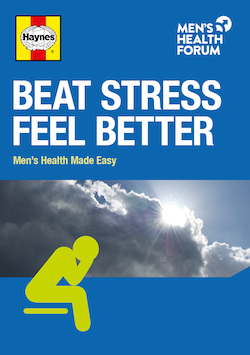HEALTH WARNING
We are no longer updating our Covid-19 hub regularly. That includes this page. Click here for the latest.
Anxiety FAQs

Everybody feels anxious from time to time - a little worried, a bit uneasy. Usually fretting about the future. Exam nerves. A job interview. Catching a train.
However, sometimes the anxiety is not eased when whatever it is that you’re worrying about is resolved. You catch the train and then you start worrying about whether it will be delayed.
Isn't that normal?
It's certainly pretty common - especially when, at the end of that journey, is the exam you’re fretting about or the job interview.
If, at the end of the day, you can relax, put your feet up and have a cup of tea or restore your balance with a run or other exercise then your anxiety is probably nothing to get anxious about. If you’re finding that the anxiety never goes away, that’s when you might want to think if there’s anything you can do about it.
During a war or pandemic, when lives are lived against a backdrop of uncertainty and chance, it's understandable that perhaps more people than usual will be affected by what is sometimes called ‘generalised anxiety disorder’ (GAD): feeling anxious nearly all the time about many (or most) things rather than something specific.
GAD. Caused by too much ‘gadding about’?
Very good. Yes, just having too much to do in our lives can cause anxiety.
We’re all different. Some thrive on running from appointment to appointment (or appear to) while some of us find just a one date in the diary overwhelming. There’s no right or wrong about it. The point is to figure out what sort of person you are. Social pressure can push us all into ‘gadding about’ but if that’s not you, it’s not surprising it makes you anxious.
Is anxiety the symptom of something else?
It can be. Anxiety can be linked to a phobia (a fear of something). A particular example is social phobia or social anxiety disorder (fear of social events).
Anxiety can also be a symptom of PTSD - post-traumatic stress disorder (caused by very stressful, frightening or distressing events such as a war or abuse).
Anxiety can be part of the sudden attacks of fear in a panic disorder.
It could be part of an autism spectrum disorder.
What are the symptoms of anxiety?
A feeling of anxiety nearly all the time is obviously a key part of it. You might well feel restless and unable to settle to any task. You may have trouble sleeping.
Physically, you may feel dizzy or have palpitations (a sudden rapid heartbeat) or stomach issues such as diarrhoea and indigestion.
What’s the cause?
We are talking about anxiety more. Does that mean it's more common? Probably. If so, then the increasing pace of life and need to be ‘on’ and ‘available’ all the time in a 24/7 digital society has got to be in the dock - although not everyone (including perhaps your boss) would accept that.
Science has pointed to overactivity in the part of the brain concerned with emotions or an imbalance of certain brain chemicals (such as serotonin and noradrenaline).
Anxiety can run in families - it may be genetic, it may be something we ‘learn’.
Both our past - childhood trauma, abuse etc - and our present - living in physical pain or fear - can contribute to our feelings of anxiety.
The NHS reckon about 1 person in 20 experiences GAD. It affects slightly more women than men and is more common in mid-life (35-59).
What’s the treatment?
Talking therapies (such as counselling and CBT), mindfulness and drugs (such as SSRI anti-depressants) can all help but there is also much you can do yourself.
Although it may be tough initially, cutting down alcohol, caffeine and cigarettes will help a lot.
Find out about the five ways to well being. Regular exercise and being more mindful (ie living in the present moment rather than fretting about the past or future) are particularly useful for easing anxiety. But what precisely works for you will depend on the point we made right at the start: knowing yourself. Figure out what works for you. If it’s not illegal and not harming anyone (including yourself), give it a try.
Date published
19/05/20
Date of last review
19/05/20
Date of next review
19/05/23
References
|
The Men’s Health Forum need your support It’s tough for men to ask for help but if you don’t ask when you need it, things generally only get worse. So we’re asking. In the UK, one man in five dies before the age of 65. If we had health policies and services that better reflected the needs of the whole population, it might not be like that. But it is. Policies and services and indeed men have been like this for a long time and they don’t change overnight just because we want them to. It’s true that the UK’s men don’t have it bad compared to some other groups. We’re not asking you to ‘feel sorry’ for men or put them first. We’re talking here about something more complicated, something that falls outside the traditional charity fund-raising model of ‘doing something for those less fortunate than ourselves’. That model raises money but it seldom changes much. We’re talking about changing the way we look at the world. There is nothing inevitable about premature male death. Services accessible to all, a population better informed. These would benefit everyone - rich and poor, young and old, male and female - and that’s what we’re campaigning for. We’re not asking you to look at images of pity, we’re just asking you to look around at the society you live in, at the men you know and at the families with sons, fathers and grandads missing. Here’s our fund-raising page - please chip in if you can. |



